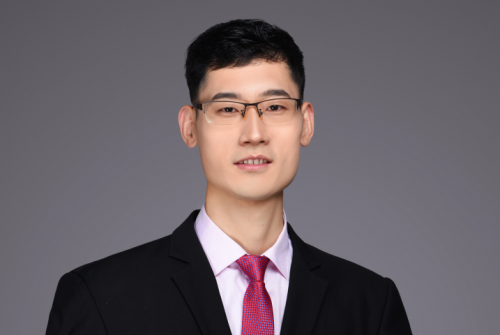Faculty

Dr. Yi-Feng Chen, research assistant professor in the Department of Biomedical Engineering of Southern University of Science and Technology (2023-present). He received the M.Sc. and Ph.D. degrees from the School of Information Engineering, Wuhan University of Technology, China. Dr. Chen also came to Yuan Ze University in Taiwan and the University of Auckland in New Zealand for two years study as an exchange student in 2012 and 2015, respectively. He has completed a postdoctoral fellowship with joint appointment from the Academy for Advanced Interdisciplinary Studies and the Department of Biomedical Engineering, Southern University of Science and Technology, China. Dr. Chen has broad research interests and experience across biomedical signal processing, especially in brain monitoring during anesthesia and in the intensive care unit, brain-computer interfaces, neural networks and artificial intelligence.
Education:
2014.9 - 2017.10 Ph.D. School of Information Engineering, Wuhan University of Technology, China
Supervisor: Quan Liu
2011.9 - 2014.6 M.Sc. School of Information Engineering, Wuhan University of Technology, China
Supervisor: Zude Zhou
2007.9 - 2011.6 B. Sc. School of Information Engineering, Wuhan University of Technology, China
Work Experience:
2020.11 - 2022.11 Postdoc Southern University of Science and Technology, Shenzhen, China
2018.01 - 2020.10 System Engineer Wuhan United Imaging Healthcare Co., Ltd., Wuhan, China
Research Area:
1. Brain-computer interface
2. Machine learning
3. Signal processing
4. Depth of anesthesia monitoring based on EEG
Representative Publications:
1. Yi-Feng Chen#, Ruiqi Fu#, Junde Wu, Jongbin Song, Rui Ma, Yi-chuan Jiang, Mingming Zhang*, Continuous Bimanual Trajectory Decoding of Coordinated Movement from EEG Signals, IEEE Journal of Biomedical and Health Informatics, vol. 26: 6012-6023, 2022. (IF: 7.021)
2. Mingming Zhang#, Junde Wu#, Jongbin Song, Ruiqi Fu, Rui Ma, Yi-chuan Jiang, Yi-Feng Chen*, Decoding Coordinated Directions of Bimanual Movements from EEG Signals, IEEE Transactions on Neural Systems and Rehabilitation Engineering, vol. 31: 248-259, 2022. (IF: 4.528)
3. Yi-Feng Chen; Shou-Zen Fan; Maysam F. Abbod; Jiann-Shing Shieh*; Mingming Zhang*, Electroencephalogram Variability Analysis for Monitoring Depth of Anesthesia, Journal of Neural Engineering, vol. 18, no. 6, 2021, Art no. 066015. (IF=5.379)
4. Yi-Feng Chen; Shou-Zen Fan; Maysam F. Abbod; Jiann-Shing Shieh*; Mingming Zhang*, Nonlinear Analysis of Electroencephalogram Variability as a Measure of the Depth of Anesthesia, IEEE Transactions on Instrumentation and Measurement, vol. 71, 2022, Art no. 4004413. (IF=5.332)
5. Ruiqi Fu, Yi-Feng Chen, Yongqi Huang, Shuping Chen, Feiyan Duan, Jiewei Li, Jianhui Wu, Dongmei Jiang, Junling Gao, Jason Gu, Mingming Zhang*, Chunqi Chang*, Symmetric Convolutional and Adversarial Neural Network Enables Improved Mental Stress Classification from EEG, IEEE Transactions on Neural Systems and Rehabilitation Engineering, vol. 30: 1384-1400, 2022. (IF: 4.528)
6. Rui Ma; Yichuan Jiang; Yi-Feng Chen; Mingming Zhang*, A New EEG-based Paradigm for Classifying Intention of Compound-Limbs Movement, IEEE International Conference on Advanced Robotics and Mechatronics (ARM), July 7-9, 2022, Guilin, China. (Best Conference Paper Award Finalist)
7. Yi-Feng Chen; Kiran Atal; Sheng-Quan Xie; Quan Liu*, A New Multivariate Empirical Mode Decomposition Method for Improving the Performance of SSVEP-based Brain-computer Interface, Journal of Neural Engineering, vol. 14, no. 4, 2017, Art no. 046028. (IF=5.379)
8. Quan Liu; Yi-Feng Chen; Shou-Zen Fan; Maysam F. Abbod; Jiann-Shing Shieh*, Quasi-periodicities Detection Using Phase-rectified Signal Averaging in EEG Signals as a Depth of Anesthesia Monitor, IEEE Transactions on Neural Systems and Rehabilitation Engineering, vol. 25: 1773 - 1784, 2017. (IF: 4.528)
9. Quan Liu; Yi-Feng Chen; Shou-Zen Fan; Maysam F. Abbod; Jiann-Shing Shieh*, EEG Artifacts Reduction by Multivariate Empirical Mode Decomposition and Multiscale Entropy for Monitoring Depth of Anaesthesia during Surgery, Medical & Biological Engineering & Computing, vol. 55: 1435-1450, 2017. (IF: 3.079)
10. Quan Liu; Yi-Feng Chen; Shou-Zen Fan; Maysam F. Abbod; Jiann-Shing Shieh*, Improved Spectrum Analysis in EEG for Measure of Depth of Anesthesia based on Phase-rectified Signal Averaging, Physiological Measurement, vol. 38, no.2, 2017, Art no. 116. (IF: 2.688)
11. Quan Liu; Yi-Feng Chen; Shou-Zen Fan; Maysam F. Abbod; Jiann-Shing Shieh*, A Comparison of Five Different Algorithms for EEG Signal Analysis in Artifacts Rejection for Monitoring Depth of Anesthesia, Biomedical Signal Processing and Control, vol. 25: 24-34, 2016. (IF: 5.076)
12. Yi-Feng Chen; Jiann-Shing Shieh; Shou-Zen Fan; Wan-Ting Chiang; Maysam F. Abbod; Quan Liu*, Analyzing Heart Rate Variability Using a Photoplethysmographic Signal Measuring System, IEEE/ASME International Conference on Mechatronic and Embedded Systems and Applications (MESA), 29-31 Aug. 2016, Auckland, New Zealand.
13. Quan Liu; Yi-Feng Chen; Shou-Zen Fan; Maysam F. Abbod; Jiann-Shing Shieh*, EEG Signals Analysis Using Multiscale Entropy for Depth of Anesthesia Monitoring during Surgery through Artificial Neural Networks, Computational and Mathematical Methods in Medicine, vol. 2015, 2015, Art no. 232381. (IF: 2.809)


